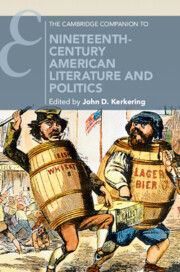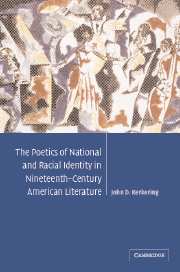23 results

The Cambridge Companion to Nineteenth-Century American Literature and Politics
- Coming soon
-
- Expected online publication date:
- June 2024
- Print publication:
- 30 June 2024
-
- Book
- Export citation
John Michael, Secular Lyric: The Modernization of the Poem in Poe, Whitman, and Dickinson (New York: Fordham University Press, 2018, $35.00). Pp. 255. isbn978 0 8232 7972 2.
-
- Journal:
- Journal of American Studies / Volume 54 / Issue 4 / October 2020
- Published online by Cambridge University Press:
- 18 September 2020, pp. 821-822
- Print publication:
- October 2020
-
- Article
- Export citation
Chapter 17 - The South in Reconstruction
- from Part II - A New Nation: Poetry from 1800 to 1900
-
-
- Book:
- The Cambridge History of American Poetry
- Published online:
- 05 December 2014
- Print publication:
- 27 October 2014, pp 383-402
-
- Chapter
- Export citation
Notes on Contributors
-
-
- Book:
- The Cambridge History of American Poetry
- Published online:
- 05 December 2014
- Print publication:
- 27 October 2014, pp xi-xviii
-
- Chapter
- Export citation
28 - Theories of poetry
- from VI - Genre criticism
-
-
- Book:
- The Cambridge History of Literary Criticism
- Published online:
- 05 February 2013
- Print publication:
- 07 February 2013, pp 524-538
-
- Chapter
- Export citation
Notes on contributors
-
-
- Book:
- The Cambridge History of Literary Criticism
- Published online:
- 05 February 2013
- Print publication:
- 07 February 2013, pp ix-xiv
-
- Chapter
- Export citation
Notes
-
- Book:
- The Poetics of National and Racial Identity in Nineteenth-Century American Literature
- Published online:
- 22 September 2009
- Print publication:
- 11 December 2003, pp 236-315
-
- Chapter
- Export citation
Introduction: the poetics of identity
-
- Book:
- The Poetics of National and Racial Identity in Nineteenth-Century American Literature
- Published online:
- 22 September 2009
- Print publication:
- 11 December 2003, pp 1-32
-
- Chapter
- Export citation
Conclusion: the conservation of identities
-
- Book:
- The Poetics of National and Racial Identity in Nineteenth-Century American Literature
- Published online:
- 22 September 2009
- Print publication:
- 11 December 2003, pp 200-235
-
- Chapter
- Export citation

The Poetics of National and Racial Identity in Nineteenth-Century American Literature
-
- Published online:
- 22 September 2009
- Print publication:
- 11 December 2003
Frontmatter
-
- Book:
- The Poetics of National and Racial Identity in Nineteenth-Century American Literature
- Published online:
- 22 September 2009
- Print publication:
- 11 December 2003, pp i-viii
-
- Chapter
- Export citation
PART I - THE POETICS OF NATIONAL IDENTITY
-
- Book:
- The Poetics of National and Racial Identity in Nineteenth-Century American Literature
- Published online:
- 22 September 2009
- Print publication:
- 11 December 2003, pp 33-34
-
- Chapter
- Export citation
Index
-
- Book:
- The Poetics of National and Racial Identity in Nineteenth-Century American Literature
- Published online:
- 22 September 2009
- Print publication:
- 11 December 2003, pp 343-351
-
- Chapter
- Export citation
PART II - THE POETICS OF RACIAL IDENTITY
-
- Book:
- The Poetics of National and Racial Identity in Nineteenth-Century American Literature
- Published online:
- 22 September 2009
- Print publication:
- 11 December 2003, pp 111-112
-
- Chapter
- Export citation
4 - “Blood will tell”: literary effects and the diagnosis of racial instinct
-
- Book:
- The Poetics of National and Racial Identity in Nineteenth-Century American Literature
- Published online:
- 22 September 2009
- Print publication:
- 11 December 2003, pp 152-199
-
- Chapter
- Export citation
1 - “We are five-and-forty”: meter and national identity in Sir Walter Scott
-
- Book:
- The Poetics of National and Racial Identity in Nineteenth-Century American Literature
- Published online:
- 22 September 2009
- Print publication:
- 11 December 2003, pp 35-67
-
- Chapter
- Export citation
3 - “Of me and of mine”: the music of racial identity
-
- Book:
- The Poetics of National and Racial Identity in Nineteenth-Century American Literature
- Published online:
- 22 September 2009
- Print publication:
- 11 December 2003, pp 113-151
-
- Chapter
- Export citation
Bibliography
-
- Book:
- The Poetics of National and Racial Identity in Nineteenth-Century American Literature
- Published online:
- 22 September 2009
- Print publication:
- 11 December 2003, pp 316-342
-
- Chapter
- Export citation
List of illustrations
-
- Book:
- The Poetics of National and Racial Identity in Nineteenth-Century American Literature
- Published online:
- 22 September 2009
- Print publication:
- 11 December 2003, pp x-x
-
- Chapter
- Export citation
List of abbreviations
-
- Book:
- The Poetics of National and Racial Identity in Nineteenth-Century American Literature
- Published online:
- 22 September 2009
- Print publication:
- 11 December 2003, pp xiii-xiv
-
- Chapter
- Export citation



